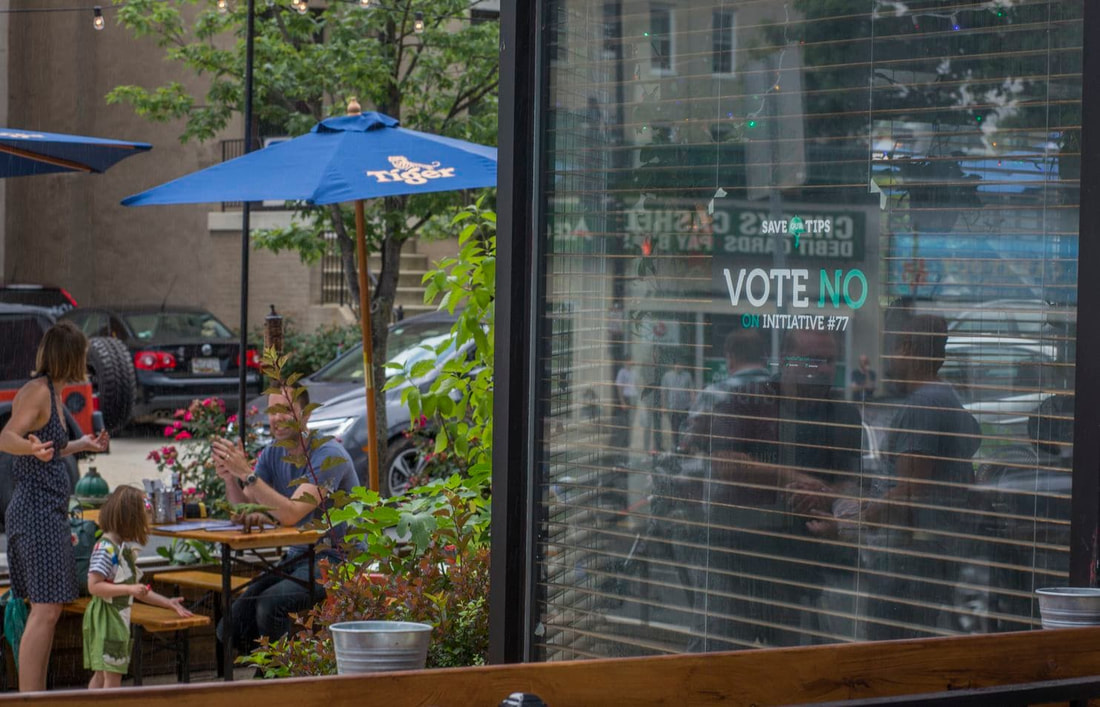On Initiative 77, the D.C. Council Should Listen to the Experts - Commentary at Washington Post7/21/2018 Service industry workers — wait staff, bartenders and the like — are experts in free-market economics. They enjoy immediate and tangible reward for their hard work in the form of tips, and the best servers can make hundreds of dollars per shift through hard work, positivity and attentiveness.
When they aren’t feeling it, the effects are equally tangible — in the form of less pay at the end of a shift. There are other variables, of course, but tipped service workers enjoy something that’s increasingly rare in our salary and set-wage world: They have a real degree of control over how much they earn daily. So it’s no surprise that many oppose the District’s minimum wage hike for tipped workers. When Initiative 77 was presented to D.C. voters in June, it was sold as a progressive reform for an industry with struggling workers. The measure, approved 55 percent to 45 percent , will raise the minimum wage for tipped staff from the current $3.33 per hour to $4.50 in July and eventually to D.C.’s standard $15 per hour by 2025. Yet the workers themselves opposed it. They formed “Save Our Tips” groups on social media, and they lobbied hard against it. Why? Because they knew its effect wouldn’t be to set a lower limit on how much they could earn; instead, it would set an upper limit. It’s simple economics. Restaurant owners will probably compensate for mandated higher server wages by raising food prices. The predictable effect is fewer customers. And the remaining customers will be less inclined to tip. Proponents of Initiative 77 said customers would be free to tip, but the legislation itself makes no mention of that. Tipping culture could die, leaving the ambitious wait staff or bartenders scraping by on what government — not their customers — says they’re worth. And it’s not just the workers at risk. The bustling D.C. food scene will drastically change. Food writer Todd Kliman (formerly of the Washingtonian ) knows what will happen if the D.C. Council doesn’t repeal the measure. “Get ready for it, DC,” he tweeted. “Those cocktails that’re overpriced [right now] at $14? Soon enough they’ll be going for $18. And you’ll be lucky to find apps below $16 at anywhere decent. Entrees? $36-$40, easy. Initiative 77 is gonna make [restaurants] even more a place for those with $$$.” And the small, family-owned restaurants and neighborhood bars will be hit the hardest. Their margins are typically small, and with rising rents, additional costs will force more of them to close or relocate outside the District. But really, this is a battle over minimum wages. Supporters of Initiative 77, “Fight for $15 ” and similar measures call for a “living wage,” but the truth is that despite their good intentions, minimum-wage hikes hurt the very people they’re attempting to help. There’s a rare near-consensus among economists that price controls lead to poor outcomes in the marketplace. The classic example is the price controls on gasoline the federal government put in place in the 1970s. The outcome: long lines and significant shortages. This is also true of restaurants. When government demands that employers pay more for labor, then employers can afford less of it. On a not-unrelated note, the first hamburger-making robot has gone online in a San Francisco restaurant. Such technology shows that when government steps in and forces up wages, employers have ways to work around them. To put it simply, no matter what the minimum wage is in law, the actual minimum wage is always zero. An unemployed person who lost his job or can’t find one because of high labor costs earns nothing. Servers and tipped staff understand this simple economic concept, and that’s why they’re so vehemently against Initiative 77. The D.C. Council has already taken steps to repeal the measure, and Congress is stepping in. That’s good — it’s good for the economy, it’s good for the industry, and it’s good for the workers who will again have control over their own prosperity. https://www.washingtonpost.com/opinions/on-initiative-77-the-dc-council-should-listen-to-the-experts/2018/07/19/9b56b292-86d0-11e8-8f6c-46cb43e3f306_story.html?noredirect=on&utm_term=.b351196371fc
0 Comments
Leave a Reply. |
Vance Ginn, Ph.D.
|


 RSS Feed
RSS Feed